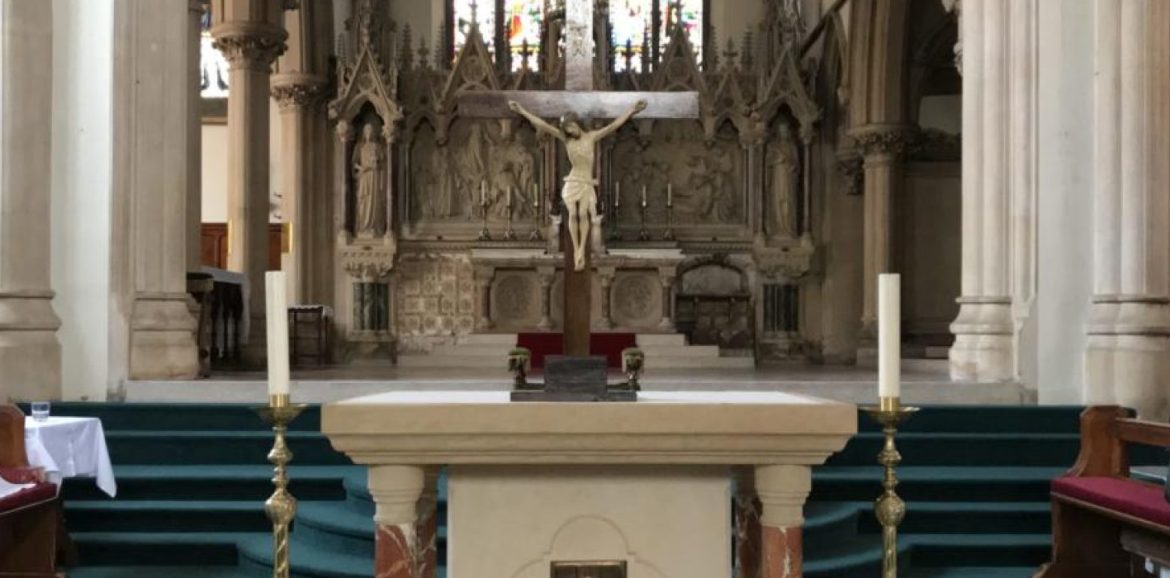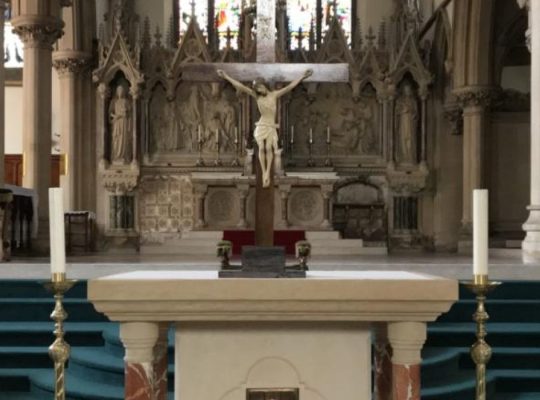Once again this week, the Gospel is an account of a teaching given by Jesus in Jerusalem before his Passion. It is the last saying we hear in the Sunday assembly this year. It is fitting for us to pay great attention to this “conclusion” to a Book that we have heard read for so many weeks. We should come into this liturgy feeling caught up, as by a symphony, with its fortes and pianos, its alternation of quick and slow tempos.
The Gospel of Luke begins in the Temple of Jerusalem, with the vision of Zechariah wherein he was told that he would have a son and he would name him John, who was to be the precursor of the Lord.
The infant Jesus was presented in the Temple to two prophets, Simeon and Anna, who recognised him as the anointed of the Lord.
Beginning at the age of twelve, he went every year to Jerusalem on the Passover pilgrimage, and Luke tells us that once he stayed three days in the Temple “sitting in the midst of the teachers, listening to them and asking them questions,” and “all who heard him were astounded at his understanding and answers.”
It is at the Temple that Jesus gives his disciples and the crowd his final teachings, of which todays Gospel contains the central part.
Some of those around Jesus were speaking about the Temple, admiring how it “was adorned with costly stones and votive offerings.” He certainly shared this admiration for the holy place of his people, since he, more than anyone else, understood its significance, and he could not speak of its destruction without deep emotion. Luke tells us that when Jesus came near to Jerusalem, he “wept over it” at the thought that it would be destroyed and that its enemies would not “leave one stone upon another.” Imagine what he must have felt when he spoke of the destruction of the Temple, the jewel of the city, heart of Jerusalem and unique centre of worship for the people of the covenant, the sanctuary of the presence of God among his people.
The questions “Teacher, when will this happen? And what sign will there be when all these things are about to happen?” Are asked lightly, as if it were any event whatever, a small catastrophe involving the destruction of an impressive building. The destruction of the Temple is tantamount to the end of the world; it is the signal of the apocalypse! Jesus was aware of this connection, and Luke knew that there was a tendency among the Christians to expect the return of the Lord in glory very soon. So he was careful to separate the discourse on the last times from that on the Temples ruin. Did he suspect that such expectation would run wild in times of crisis? He would have been quite right. How many times throughout the centuries have people preached that “the end of the world is near”! Such misguided messages are prevalent even today.
Therefore, we must always remember this clear warning: “See that you are not led astray, for many will come in my name, saying, ‘I am he’ and ‘the time is at hand.’ Do not go after them.” Those who speak thus are imposters, who threaten the faith because they set themselves up as prophets to be followed blindly, and thus turn people from following the Lord.
Luke insists on this point.
The parable of the sums of money is addressed to people who thought that the kingdom of God would appear there immediately. The rich man who gave each of his servants ten gold coins left for: ”a distant country.” In the parable of the tenants, the owner of the vineyard “went on a journey for a long time.”
Jesus explicitly states that wars and upheavals should not be interpreted as the first pangs of the end. History confirms this. The Jewish revolt in A.D. 70, the destruction of the Temple, the diaspora throughout the following centuries, did not stop the course of history. Nor did the later tumults of the “barbarian invasions” presage a destruction of the world. The same can be said about the appearance of the great heresies that shook the Church and society, as well as the disillusion of Christendom. Wars and uprisings—which still surround us today— should not even be remotely understood as signs; they have nothing to do with the end of the world. These hardships, indeed difficult to endure, should not frighten us. Such events have nothing to do with those that will presage the end. Jesus says: “When you hear of wars and tumult, do not be terrified, for such things must first take place, but the end will not be at once….Nation will rise against nation, and kingdom against kingdom. There will be great earthquakes, in various places famines and pestilence. And there will be terrors and great signs from heaven.”
The Gospel here skips quickly over these upheavals to highlight their difference with the cosmic calamities to come: “There will be signs in the sun, the moon, and the stars, and on earth nations will be in dismay, perplexed by the roaring of the sea and the waves. People will die of fright in anticipation of what is coming upon the world, for the powers of the heavens will be shaken. And they will see the Son of Man coming in a cloud with power and great glory.” But even then, believers must not be afraid. “But when these signs begin to happen, stand erect and raise your heads because your redemption is at hand.”
After this parenthetical remark, the Gospel returns to what will happen “before any of this,” now meaning that the end is not imminent: the persecution of Christians does not signify that the end of the world is near. Rather, they characterise their situation in the present. Jesus cannot be said to soften the harshness of these persecutions. “You will even be handed over by parents, and brothers and sisters, relatives, and friends, and they will put some of you to death. You will be hated by all because of my name…” But the call to patient endurance, the assurance of gaining eternal life, is even stronger. The persecuted Christians will not even have to think about their defence! “For I myself shall give you a mouth and wisdom, which none of your adversaries will be able to withstand or contradict .”
Surely, this must make us think of Stephen; Luke tells us in Acts that his opponents “could not withstand the wisdom and the spirit with which he spoke.” Stoned to death, he died like Jesus did, crying out “in a loud voice, ‘Lord, do not hold this sin against them.’”
“It will lead to you giving testimony.” This translation agrees with what is said in Matthew and Mark: “And you will be led before governors and kings for my sake as a witness before them and the pagans” Do we not call these people ’martyrs.’
(i.e.. witnesses) who confess their faith at the cost of their own life? Luke certainly understands this mode of witnessing. He recounts many examples of it in Acts. He notes that Saul assisted in the martyrdom of Stephen, who ought to come to mind when the Lord says to him on the road to Damascus: “I am Jesus, whom you are persecuting.” But the line could also be translated: “This opportunity will witness for you.”Thus, it refers to the benefits gained by the martyrs for themselves by their witness: the sufferings they endure speak for them before God.
Thus, Christians are persecuted like Christ. Remember it is because he was obedient unto death, death on a cross, that he has been raised to the right hand of the Father (Phil 2:8-9) His sufferings are credited to him by God; by his perseverance he has gained eternal life in the glory of the resurrection. Therefore, it is towards him that these sayings turn our attention. In the light of the paschal mystery, in which we share by being persecuted in the name of Jesus, everything else receives its full meaning, particularly the paradoxical affirmation: “They will put some of you to death…..but not a hair on your head will perish. By your endurance you will gain your lives.” There is no argument or discussion in this encouragement and call to perseverance. It is enough that they implicitly evoke Christ, the faithful witness to whom God has himself given testimony, Christ whose Passover is celebrated in each Eucharist.
“Behold the coming of the day of the Lord!” This cry echoes throughout the Bible. At the beginning of his ministry, Jesus declared that he had been sent “to proclaim the good news of the kingdom of God.” Luke tells us at various times, and especially on the road to Jerusalem, that, “the kingdom of heaven is at hand.”After so many “visits” in the past, “in these last days” God has visited us by sending us his Son “whom he made heir of all things and through whom he created the universe,” who “took his seat at the right hand of the Majesty on high.” Each time we recite the creed we proclaim that the Lord “will come in glory to judge the living and the dead; and his kingdom will have no end.” We await the coming of “that day”: “Come Lord Jesus!” We wait for him in peace and confidence, while refusing to be misled by those who may come (pretending) in his name, and saying: “I am he,” those who, deducing from wars, revolutions, or persecutions of the disciples or the Church, conclude that the last day is at hand.
Our serenity is based not on our merits but on the mercy and grace of the Lord. And so, we await the second coming with confidence:
“So favoured in this world that our judge comes not as a stranger, but one who being like us, can fully sympathise with our weaknesses. The one who died for love of us is given the task of giving measure and value to his work……….our brother will judge his brothers. In the second coming, may he who is our hope and salvation in his mercy and kindness be mindful of us.” (John Henry Newman).
Knowing God and the One who intercedes for us with him, the believer can face death calmly. Each liturgy—especially the Eucharist—celebrates the Lord who has come, is coming, and will come. Further, each liturgical and sacramental celebration is the “coming,” the “visit” of God here and now.
“Stay awake, praying at all times for the strength to stand with confidence before the Son of Man………..Your endurance will win you your lives!”


